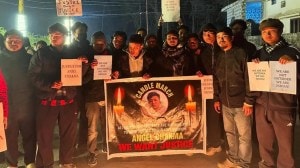Hu146;s eight commandments
After Hu Jintao, the President of China and Chairman of the CPC, issued a set of eight do8217;s and eight don8217;ts to improve the moral ...

After Hu Jintao, the President of China and Chairman of the CPC, issued a set of eight do8217;s and eight don8217;ts to improve the moral standards of Chinese people, the party has gone into an overdrive.
Party units everywhere, from factories to universities, are getting members to memorise the 8216;8216;eight glories and eight disgraces8217;8217; in study sessions. Posters are up everywhere and party volunteers are out in the street exhorting others and parading 8216;8216;model citizens8217;8217;.
If you can8217;t hold your breath for the latest from CPC8217;s divinity school, here are the eight commandments first announced by Hu at the National Peoples Congress last month:
Love the motherland, do not harm it
Serve the people, don8217;t disserve them Uphold science; don8217;t be ignorant and unenlightened
Work hard; don8217;t be lazy
Be united and help each other; don8217;t gain benefits at the expense of others
Be honest and trustworthy, don8217;t profiteer at the expense of your values
Be disciplined and law-abiding instead of chaotic and lawless
Know plain living and hard struggle, do not wallow in luxuries and pleasures
The New China News Agency called the edict 8216;8216;a perfect amalgamation of traditional Chinese values and modern virtues8217;8217;. The People8217;s Political Consultative Conference, a kind of upper House of the Chinese Parliament passed a resolution saying, 8216;8216;Let it be a paragon and common practice of the times.8217;8217; All the hallmarks of a classic CPC campaign!
Communist Moralpolitik
Outsiders might be pardoned for thinking Hu had borrowed the code from scouts and guides. Liberals everywhere might smirk at the party state turning the nanny in China.
Those seeking individual freedom will be reminded of the religious vigilantes in Saudi Arabia and Iran promoting virtue and punishing vice among the flock.
In China, the party does nothing without due deliberation and political purpose. Don8217;t for a moment underestimate the seriousness of Hu and the CPC in trying to encourage eight virtues and discourage an equal number of disgraces.
Nearly two years ago Hu told the Central Party School about the urgent need to address the profound crisis in China by re-discovering Marxist thought, revisiting the essence of Maoism and renewing traditional Chinese culture. The CPC8217;s moralpolitik seems part of an attempt to build a 8216;8216;harmonious society8217;8217; in China. It is based on the recognition that two and a half decades of explosive growth has generated unprecedented economic inequality, growing political unrest and a moral vacuum.
If Mao Zedong led the revolution and Deng Xiaoping national development, Hu believes his task lies in rejuvenating the moral fibre of the Chinese society.
Analysts, however, say the campaign is really about countering growing levels of corruption in the party and state organs all around the nation. Hu fears that, if left unchecked, all-pervasive corruption could undermine the legitimacy of the party-state in China.
All political campaigns in China, however, carry the inherent risk of turning against the establishment. In the next few months, the challenge for Hu and his colleagues would be to ensure that the high profile campaign on moral values stays under political control.
Rediscovering Buddhism
When the party-state in China begins to talk about morality and traditional values, it is but one short step towards finding religion. Not surprisingly Confucius has already been restored in China.
In the last few months, the party has been calling upon school children to return to studying the analectics of Confucius. Now it is the turn of Buddhism.
For years reports from China had suggested a growing number of citizens returning to Buddhist religion, that had been so actively discouraged in the early decades of revolutionary China.
Next week the first ever officially sponsored religious conference, the World Buddhist Forum, will kick off in Hangzhou in the eastern province of Zhejiang.
An official statement from Beijing says the Forum would offer 8216;8216;a high-level platform for Buddhists from around the world to have dialogue, exchanges and cooperation and a stage for Chinese Buddhists to exercise their wisdom8217;8217;.
About 1,000 monks and Buddhist scholars from about 30 countries are expected to participate in the four-day conference.
Observers say the party might be hoping that a return to religiosity could provide a moral compass to the Chinese citizenry as well as much needed inner strength for disadvantaged sections to cope with adversity.
Who said religion is the opium of the masses? In Communist China it might yet have a political utility.
Letting the Dalai Lama In
If Buddhists from around the world are congregating in China, what about the most famous symbol of the faith 8212; the Dalai Lama? Last month, in an important speech, the Dalai Lama had publicly expressed his well-known desire to go on a spiritual pilgrimage to the Buddhist sites in China.
The Dalai Lama had also offered important political concessions by reaffirming his renunciation of separation from China and recognising the importance of the 17-point agreement with Beijing in 1951 as the basis of a new political settlement between Tibetan people and the Chinese state.
In comments prominently displayed by official media in China earlier this month, Ye Xiaowen, director of the cabinet8217;s State Bureau of Religious Affairs, said Beijing was prepared to discuss the visit so long as the Dalai Lama completely gives up his separatism.
This is the most positive statement so far from Beijing on the long-standing request from the Dalai Lama. In a broader signal on greater political flexibility on religion, Ye added that Beijing is prepared to establish diplomatic ties with the Vatican, if it ends ties with Taiwan.
raja.mohanexpressindia.com
- 01
- 02
- 03
- 04
- 05































